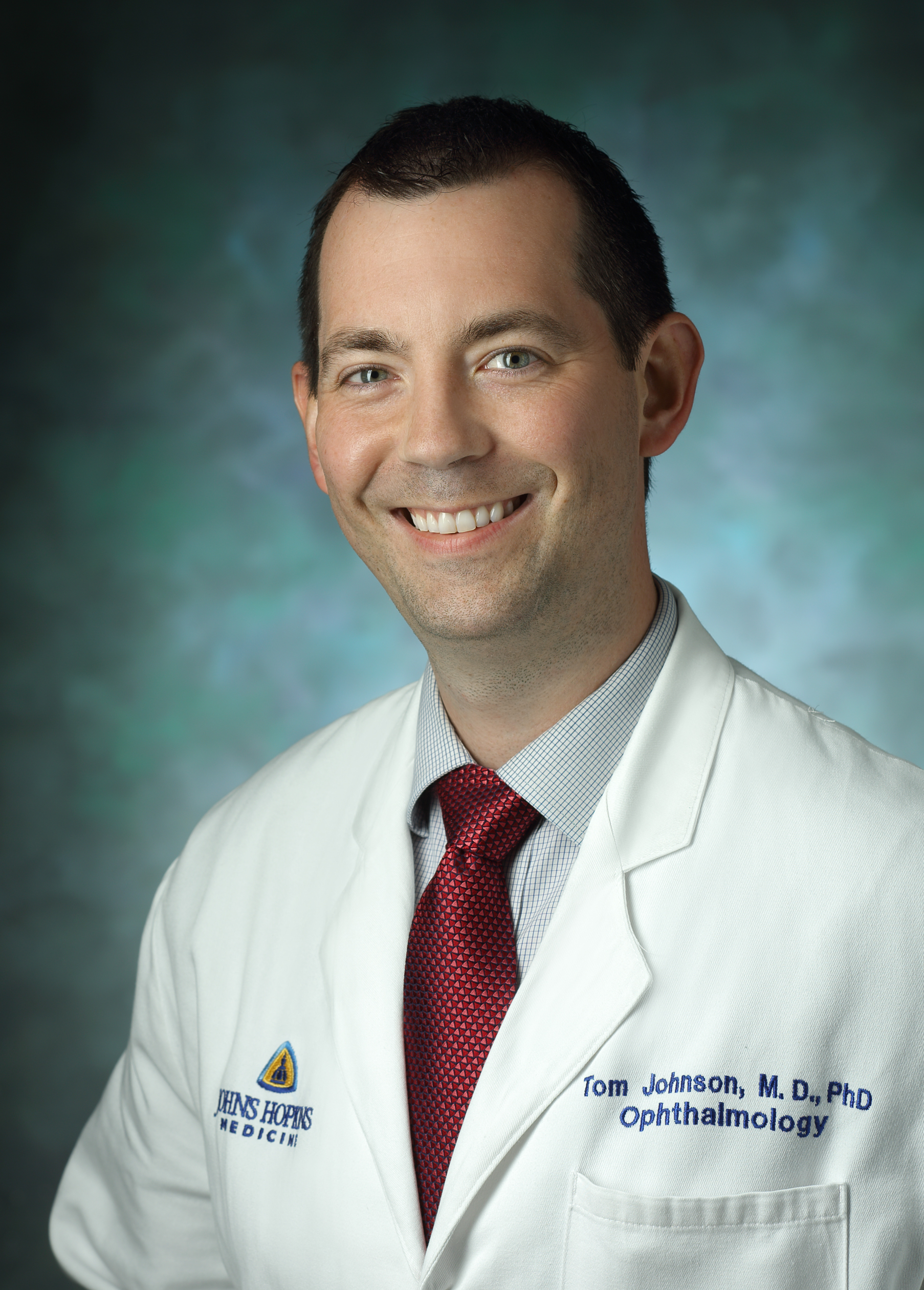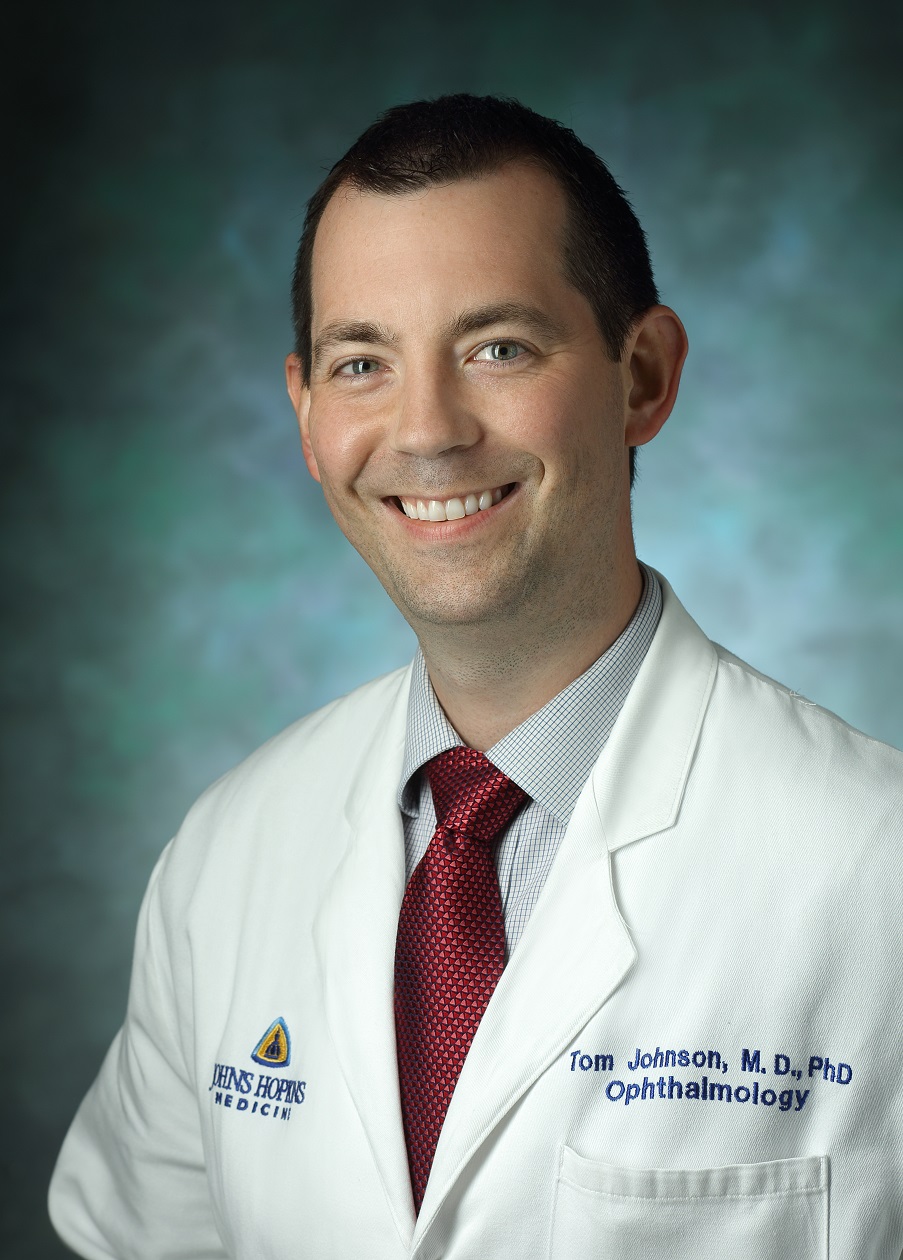
Tom Johnson talks about how he combines research into the possibilities of stem cell transplantation for optic nerve repair with his clinical work and community action.
It has become clear to me that while it is deeply meaningful to develop relationships with patients that you can care for in the clinic and operating room, biomedical discoveries that revolutionise a field can help people worldwide, and for generations to come.
Tom Johnson
When Tom Johnson was a medical student, he built a community organisation that provides free vision screenings and guaranteed follow-up medical and surgical care to people with little or no resources. That organisation, the Student Sight Savers Programme, has served hundreds of people over the past six years. Tom’s contribution was recently recognised when he was selected as the 2018 recipient of the Reverend Melvin B Tuggle Community Excellence Award.
The Award recognises sustained commitment to the community of East Baltimore by students and faculty at Johns Hopkins University.
Tom [2006] developed the programme with his mentor Professor Harry Quigley in 2012, soon after completing his PhD at the University of Cambridge and spurred in part by its commitment to social leadership. “The Johns Hopkins Medical System is a tremendous healthcare resource, but there is a disadvantaged community living around the hospital that would benefit from improved access to services. An informal survey of East Baltimore community residents identified eye care as one of their primary unmet needs. I wanted to reach out and help fill that need in my area of expertise,” he says.
Tom recruited fellow medical students and trained them to conduct vision screenings. He partnered with community organisations to identify areas of need, and identified several experienced clinical ophthalmologists to supervise screenings. Community residents screened through the programme are guaranteed a free follow-up clinic visit at Johns Hopkins and mechanisms exist to provide medical and surgical eye care to needy patients regardless their ability to pay. This work helps address the preventable causes of blindness.
Tom, who is now a Glaucoma Fellow at the Wilmer Eye Institute in the Johns Hopkins School of Medicine, has worked both as a student carrying out screenings and a clinician overseeing students. Indeed later this year he will become the organisation’s primary faculty mentor. “I’ve come full circle,” he says.
Student health activism
Tom was born in Chicago and grew up there. He developed a keen interest in health at an early age. As a child he spent many weekends at the animal hospital where his father was a veterinarian. But by the time he became a teenager, he decided he wanted to focus on medical care of humans rather than animals.
He did his undergraduate degree at Northwestern University and it was there that he first became involved in student health activism in 2003 as one of the founding members of GlobeMed alongside fellow Gates Cambridge Scholar to be Victor Roy. GlobeMed is a network of student organisations which sends unused medical supplies to developing nations where they are needed and Tom served as Treasurer and Executive Board Member.
While studying biology and neuroscience, Tom’s interests eventually gravitated towards ophthalmology. At Northwestern, he conducted ocular pharmacology research and, after graduating in 2005, he spent a post-baccalaureate year in Omaha, Nebraska working with Professor Carl Camras, a renowned glaucomatologist. Camras is best known for having discovered the most effective medication currently available for treating glaucoma.
Camras had a huge impact on Tom’s life. Tom says: “I went to Omaha to experience the day-to-day business of treating patients with eye disease, which is very fulfilling work. But I also came to understand the remarkable impact of Carl’s work as a scientist. He made his seminal observations about prostaglandin analogues and eye pressure as an undergraduate. That work led to the development of the eye drop latanoprost which continues to be the first-line treatment for glaucoma even today, more than 20 years after its development. It has been used by millions of people around the world and has helped preserve an enormous amount of vision."
Stem cell research
Tom had been accepted to medical school at the time he was working in Nebraska, but was by then so excited by the possibilities offered by biomedical research that he deferred his matriculation to pursue further research training.
He was particularly interested in the potential of stem cell transplantation for the treatment of glaucoma. “Regarding glaucoma and neurodegenerative diseases in general, our current therapies are limited to slowing down progression rather than restoring function. We simply cannot bring people’s vision back after it has been lost to optic nerve disease. Stem cell transplantation offers the possibility of repairing the optic nerve, a concept that could revolutionise medicine by reversing the clock on neurodegeneration,” says Tom.
At the time he wanted to start his PhD studies in 2006, there were many unanswered questions regarding the future of government-funded stem cell research in the United States. Cambridge was ahead of the field in stem cell biology and seemed the place to be. Being awarded a Gates Cambridge Scholarship sealed Tom’s decision.
Tom’s supervisor at Cambridge was Professor Keith Martin, a neuroscientist, and clinician specialising in glaucoma. Tom began his PhD in 2006 and one year later was accepted to the National Institutes of Health Oxford-Cambridge programme which meant he ended up spending two years with Professor Martin and two at the NIH in Washington, DC where he continued to collaborate with Professor Martin.
Tom says he deeply appreciates his time at Cambridge, particularly the emphasis on collaboration. “The number one thing I learned was the importance of working with other people, brainstorming and bouncing ideas off each other,” he says. “So much collaboration happens informally at Cambridge. There is so much intellectual stirring of the pot.”
He also found the Gates Cambridge community incredibly stimulating. Tom, who served as Vice-President (2007-08) and Social Officer (2006-07) of the Gates Cambridge Scholars Council, says: “Everyone was a stand-out in their field, and it was a diverse community where people were always making connections between seemingly divergent disciplines. Many scholars became friends for life.”
Cambridge also helped changed his future plans. Early on, Tom envisioned himself as a physician in private practice, seeing patients full time. At Cambridge he was convinced that becoming a clinician scientist, with one foot in research and one in patient care, was the right track to pursue.
Glaucoma Fellow
After leaving Cambridge in 2010, Tom returned to the US to complete his medical training at Johns Hopkins University, earning his medical degree in 2014. He then spent three years specialising in ophthalmology and in the medical and surgical management of glaucoma. Now that his training is nearly complete, he is eager to get back into the laboratory.
In July he will be qualified as a glaucoma specialist and neuroscientist, and will be co-directing the new Optic Nerve Regeneration Initiative at JHU. This will serve as the central hub for a cross-disciplinary research consortium aimed at achieving the goal of stem cell-mediated optic nerve repair. He is looking forward to continuing his community work and for the next five years will spend 25% of his time in the clinical care of patients and 75% in his neuroscience laboratory.
Tom says: “It has become clear to me that while it is deeply meaningful to develop relationships with patients that you can care for in the clinic and operating room, biomedical discoveries that revolutionise a field can help people worldwide, and for generations to come.”

Thomas Johnson
- Alumni
- United States
- 2006 PhD Brain Repair
- Trinity College
I am interested in the neurobiological processes that lead to retinal ganglion cell death and dysfunction in glaucoma and other optic neuropathies. In particular, I seek to better understand the molecular mechanisms underlying axonal degeneration, dendrite retraction and afferent synapse loss, and cell body death in glaucoma. My goal is to utilize knowledge of these processes to develop targeted neuroprotective strategies to slow or halt RGC death and preserve vision for patients with glaucoma. I am also actively investigating the use of stem cell transplantation to achieve retinal ganglion cell placement, as a potential regenerative treatment for optic nerve disease, with a focus on anatomic incorporation of cell grafts, neurite growth and synapse formation, and electrophysiological retinal circuit integration.
Previous Education
Northwestern University BA Biological Sciences 2005
Links
https://www.hopkinsmedicine.org/profiles/results/directory/profile/10004407/thomas-johnson
http://johnsonlabjhu.com
https://www.linkedin.com/in/thomas-v-johnson-70210311












